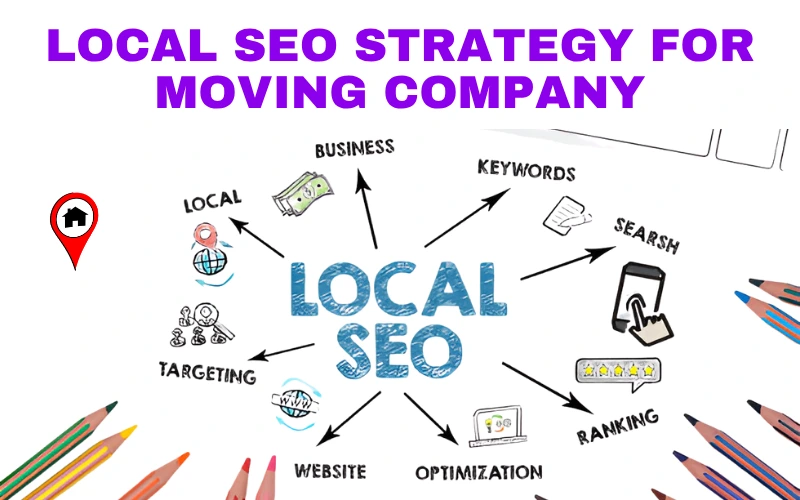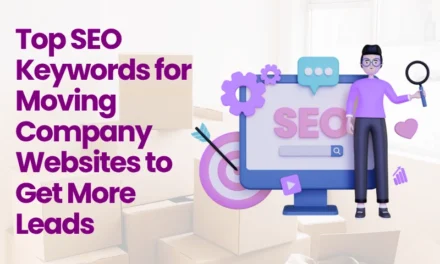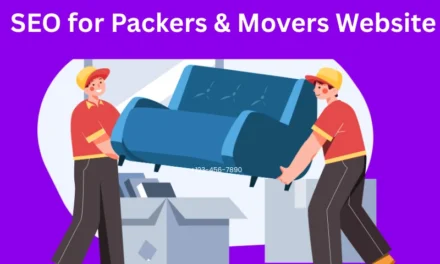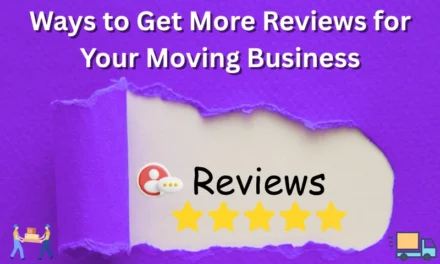If you run a moving company and want more leads without paying for ads every week, local SEO is your golden ticket.
Local search accounts for nearly 46% of all Google searches, and the majority of those result in offline action within 24 hours. For a business like yours that thrives on local demand, ranking well in search results is no longer optional; it’s essential.
In this guide, we’ll break down every key strategy that makes up a winning local SEO strategy for moving companies. You’ll learn how to appear in the map pack, build trust online, and create a web presence that keeps your phone ringing, all without blowing your budget.
What a Local SEO Strategy for Moving Company Success Looks Like
Before we dive into the tactics, it’s important to understand what makes a local SEO strategy truly effective for movers.
Unlike SEO, local SEO focuses on visibility within a specific geographic area. You’re not trying to rank across the country; you want to dominate your city, your suburbs, and the “near me” searches that lead to immediate bookings.
A well-built local SEO strategy for a moving company includes:
- Showing up in Google’s Local Map Pack when someone searches for “movers near me”
- Appearing organically in the top results for terms like “local moving services in [City]”
- Ranking individual location pages for every area you serve
- Having a Google Business Profile that generates calls, clicks, and direction requests
- Earning trust signals like reviews, citations, and backlinks that boost local rankings
It’s not just about traffic; it’s about qualified, high-intent leads. The rest of this blog breaks down the exact steps to build that kind of presence.
1. Optimize Your Google Business Profile (GBP)
Your Google Business Profile is your local storefront on Google. It’s one of the most important assets in your local SEO strategy for moving company growth.
1.1 Claim and Complete Your Profile
Start by claiming and verifying your listing. Choose the right category (“Moving Company”) and add all relevant services like:
- Local moving
- Long-distance moving
- Packing and unpacking
- Furniture assembly
Make sure your name, address, phone number (NAP), and business hours are 100% accurate.
1.2 Add Detailed Descriptions and Photos
A complete description with keywords like “local movers in [Your City]” or “packing and moving services” gives your listing more relevance. Also:
- Upload high-resolution photos of your trucks, team, and happy customers
- Businesses with more than 100 images receive 520% more calls than those without.
1.3 Post Weekly Updates
Use the “Posts” section to share promotions, moving tips, or seasonal messages. Google rewards active profiles with higher visibility in local results.
2. Create Location-Specific Landing Pages
Google doesn’t just want to rank general businesses; it wants to serve the most relevant, location-specific results. If you serve multiple cities or neighborhoods, you need a unique landing page for each.
2.1 Why Local Pages Matter
Each city has its own competition and search intent. When someone in Austin types “movers near me,” Google will prioritize websites with pages specifically about Austin.
What to Include
A great local landing page should include:
- The city name in headings, title tags, and meta descriptions
- Embedded Google Maps
- FAQs specific to that city
- Google reviews from customers in that area
- Internal links to other service pages
You should also add Local Business Schema markup to help Google understand the city and services each page represents.
3. Build and Manage Citations (NAP Consistency)
Your NAP (Name, Address, Phone) must be consistent across the internet. This is a core ranking factor in local SEO.
Why It Matters
Inconsistent business info confuses Google and reduces your credibility. According to Whitespark’s Local Search Ranking Factors, citation consistency is a top local SEO factor (Whitespark).
3.1 Where to List Your Moving Business
Start with the top directories:
- Yelp
- Angi
- HomeAdvisor
- Thumbtack
- Nextdoor
- BBB
Then list in industry-specific directories and local business chambers. Use BrightLocal, Moz Local, or Yext to manage citations at scale.
4. Generate and Manage Customer Reviews
Online reviews directly affect how high you rank in local search and how many customers actually click on your business.
4.1 Why Reviews Matter for SEO
Google uses reviews to determine both relevance and trust. More reviews = more authority. In fact, 88% of customers trust reviews as much as personal recommendations (BrightLocal).
4.2 How to Get More Reviews
- Ask every customer post-move via SMS or email
- Use QR codes on business cards or invoices
- Automate requests with tools like Podium, NiceJob, or Birdeye
4.3 Respond to All Reviews
Reply to both positive and negative feedback. Google favors engaged businesses, and responses show prospects that you care about service quality.
5. Publish Localized, Helpful Content
Content is still king, but for local SEO, location relevance is key.
5.1 Blog About Local Topics
Write content like:
- “Best Neighborhoods to Move to in [City]”
- “Cost of Moving in [City]: What You Should Know”
- “Rainy Season Moving Tips for [City] Residents”
These pages attract long-tail searches and boost authority.
5.2 Showcase Community Involvement
Did your team sponsor a local event or volunteer? Post about it. This adds geo-specific signals to your website and builds backlinks from community sites.
6. Earn High-Quality Local Backlinks
A local SEO strategy for moving company websites isn’t complete without backlinks.
6.1 What Are Local Backlinks?
These are inbound links from local or niche-relevant websites that point to your domain, like a feature in a local newspaper or collaboration with a realtor’s website.
How to Earn Them
- Partner with real estate agents or property managers
- Sponsor local school or charity events
- Join local business networks or chambers of commerce
- Publish PRs in regional news blogs
The more local authority sites that link to your website, the more Google trusts you.
7. Implement Structured Data (Schema)
Schema markup helps Google better understand your content and context.
7.1 Use LocalBusiness Schema
Mark up your business name, address, phone number, hours, and geo-coordinates.
7.2 Add Review and FAQ Schema
Review snippets improve click-through rates. Use the FAQ schema on your service pages to rank in “People Also Ask” boxes.
Tools like Merkle’s Schema Generator or TechnicalSEO(dot)com can help you generate code without needing a developer.
8. Ensure Your Website is Mobile-Optimized
Having a professional moving website is more than necessary in this competitive market, that too mobile responsive, as over 60% of local searches happen on mobile devices, and Google uses mobile-first indexing (HubSpot).
What to Focus On
- Fast page load speeds (under 3 seconds)
- Tap-friendly menus and forms
- Click-to-call buttons
- Clean layout with easy navigation
If your site is clunky on phones, you’ll lose both rankings and customers.
9. Track and Measure Your Local SEO Performance
You can’t improve what you don’t measure. A winning local SEO strategy for moving company websites must include consistent tracking.
9.1 Tools You Need
- Google Search Console – track rankings and indexation
- Google Analytics 4 – measure traffic, engagement, and conversions
- Google Business Profile Insights – monitor calls, views, and direction requests
- BrightLocal – track citation consistency, rankings, and reviews
9.2 Key Metrics to Watch
- Organic traffic to location pages
- GBP clicks-to-call and direction requests
- Review volume and average rating
- Local keyword rankings
10. Optimize for Voice Search and “Near Me” Keywords
Voice assistants and mobile searches continue to rise, especially for local businesses.
Why It Matters
Over 58% of people use voice search to find local businesses (PwC).
How to Optimize
- Use natural, conversational keywords like “best movers near me” or “cheap moving help in [City]”
- Include a robust FAQ section that answers questions like “How much does it cost to move a 2-bedroom apartment?”
Conclusion
Local SEO is not a one-time job. It’s a long-term strategy that brings compounding results. By optimizing your Google Business Profile, building citation consistency, earning reviews, and creating localized content, you lay the foundation for a business that Google can trust and customers can find.
A strong local SEO strategy for moving company owners doesn’t require a marketing degree, just consistent execution and a focus on the right signals.
Start with GBP optimization, then pick one strategy per week. In a few months, you’ll see the calls and bookings start to climb.
FAQs About Local SEO for Moving Companies
1. What is local SEO, and why is it important for moving companies?
Local SEO helps your moving company appear in search results for location-based queries like “movers near me.” It improves your visibility in your service area and drives high-intent leads.
2. How do I get my moving company to rank in Google Maps?
You need to optimize your Google Business Profile with accurate info, photos, service areas, and regular updates. Generating reviews and earning local backlinks also helps.
3. How many local landing pages should a moving company have?
You should create a landing page for every city or service area you target. Each page should have unique, localized content.
4. Do online reviews really impact local search rankings?
Yes. Google uses review count, freshness, and quality as ranking factors. Businesses with more positive reviews tend to rank higher.
5. What’s the best way to build local backlinks for a moving company?
Partner with realtors, sponsor community events, and get listed in local directories and press. These build authority and trust with Google.
6. How long does it take to see results from local SEO?
You may see some changes in a few weeks, but significant improvements typically take 3–6 months of consistent effort.
7. Is it necessary to hire an agency for local SEO?
Not always. Many tasks like optimizing your GBP and collecting reviews can be done in-house. However, agencies can help accelerate results with advanced strategies.
8. Can local SEO help my moving company get more calls?
Absolutely. By appearing in the map pack and top local search results, you increase the chances that local customers call you directly.





